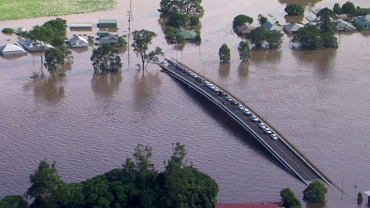The Australian Alert Service is the weekly publication of the Australian Citizens Party.
It will keep you updated on strategic events both in Australia, and worldwide, as well as the organising activities of the Citizens Party.
To subscribe to the Australian Alert Service, it's easy, and it's secure.
Lead Editorial
9 March 2022
Vol. 24 No. 10
The floods that have inundated 1,000 km along the east coast of Australia, between Gympie in Queensland and Wollongong in New South Wales, are a risk that comes with life on earth. They’re also a reminder that we need robust infrastructure and capabilities to withstand and respond to natural disasters, but what we have is a government that makes excuses. Deputy Prime Minister Barnaby Joyce claimed to ABC TV on 3 March that the government couldn’t have done anything to mitigate Lismore’s record flood. “How do you plan for something that hasn’t happened before?” he asked.
Of course, not every crisis can be foreseen, but those that can be should be acted on, and the problems that can’t should be responded to energetically, especially when people are suffering. The urgent problem for Australians is that we have governments infected with the neoliberal ideology that has permanently limited the institutional role of government in society, through privatisation and outsourcing. They don’t have a vision for the economic development of Australia; they hardly build infrastructure, especially outside of the major cities, and when they do they ensure the projects are ones that private corporations can profit from; and when disaster strikes, they quibble over whose job it is to take charge, and pay for it. What we need is governments that again take responsibility for the common good.
How to achieve that? The sheer scale of the floods is a national test, on which the government won’t get away with cheating, as they did with the 2019-20 bushfires, and many aspects of the COVID pandemic response.
In the release on p. 3, and in our Fighting Platform, the Citizens Party has put forward a clear policy for a national banking system that can restore the institutional power the government needs to fulfill its responsibilities. “Money”, or the lack of it, must never be the excuse for governments not to act on the nation’s urgent needs. The gold standard of such institutional power is the Commonwealth Bank under John Curtin and Ben Chifley in WWII, when it created the money necessary to fund the war effort. Wars have always been like that—suddenly governments can find all the money they need—but Curtin and Chifley were unique in that they explicitly planned to continue the use of the Commonwealth Bank’s power after the war, to invest in Australia’s peaceful economic development.
A national banking system would be able to create hundreds of billions of dollars to invest in the reconstruction of the flooded regions. This will be the scale of the investment needed to:
- restore and, in some cases, move the towns;
- build the flood-mitigation infrastructure needed for their long-term survival;
- rehabilitate the landscape and farming lands; and
- revive the local industries.
(It could also support a restored government insurance office, for affordable insurance.)
The Citizens Party has legislation to establish such banks, but this is not something that can wait—it must be acted on now. The good news is that the government already has the financial mechanism to implement this approach now, but they keep it secret because they are ideologically opposed to its use. That mechanism is in the Reserve Bank of Australia (RBA), which is “independent”, but, because it was spun off from the Commonwealth Bank in 1959, is subject to provisions whereby the government can direct the board to implement a government policy. The RBA demonstrated its financial capacity in 2020, when it used the quantitative easing mechanism to create more than $200 billion to inject into the private banks, to prop them up. The Morrison government has the power to order the RBA to use the same mechanism to create hundreds of billions for the federal, state and local governments to borrow at 0.1 per cent interest to invest in reconstruction.
The means are there, all we need is the will—from governments that take responsibility for the good of all.
In this issue:
- Where’s the help for devastated flood victims?
- Banks prey on customers through corrupted banking Code
- The dubious enforceability of the banking Code
- Russia sanctions create fissure in global financial system
- China’s idea of democracy is mass popular engagement
- George Washington: The revengeful spirit of factions
- Washington: Unity is the pillar of independence
- Anti-Russia war propaganda is ‘Made in Britain’
- Washington still deaf to Russia’s security demands
- RAND Corp., as MAD as ever, plots Russia’s downfall
- NATO plays with fire
- Bail-in and bank closures, or a Postal Bank?
- Imagine a different world and bring it into being!
- ALMANAC: Big finance and Green Deal strike farming: Millions will starve
Click here for the archive of previous issues of the Australian Alert Service








